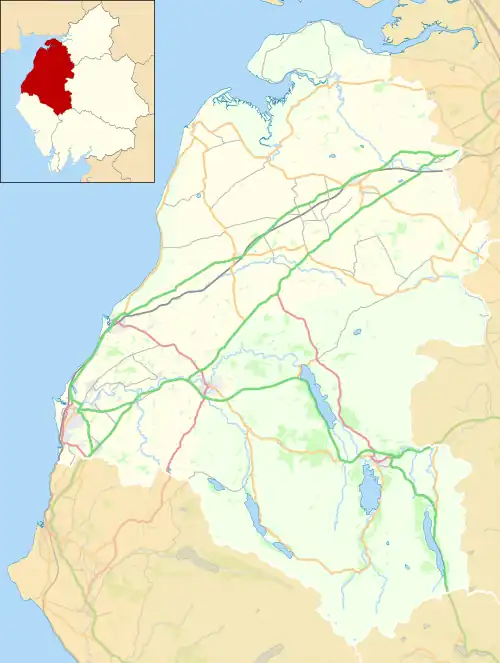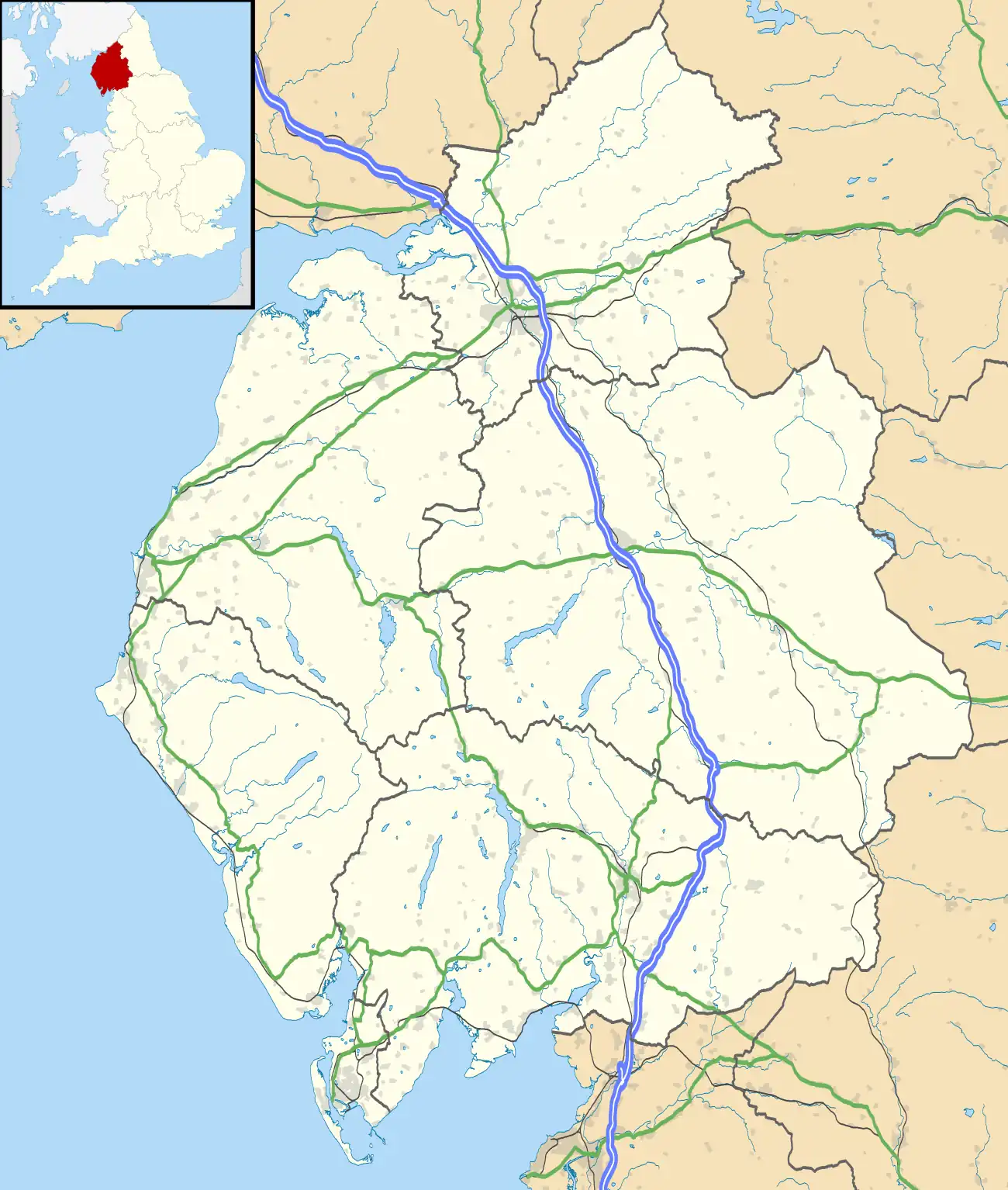Dearham
Dearham is a village and civil parish in Cumbria, historically part of Cumberland, near the Lake District National Park in England. It lies about 2 miles (3.2 km) east of Maryport and 5 miles (8.0 km) west of Cockermouth.
| Dearham | |
|---|---|
 Dearham Village Hall | |
 Dearham Location in Allerdale  Dearham Location within Cumbria | |
| Population | 2,151 (2011) |
| OS grid reference | NY075365 |
| Civil parish |
|
| Unitary authority | |
| Ceremonial county | |
| Region | |
| Country | England |
| Sovereign state | United Kingdom |
| Post town | Maryport |
| Postcode district | CA15 |
| Dialling code | 01900 |
| Police | Cumbria |
| Fire | Cumbria |
| Ambulance | North West |
| UK Parliament | |
According to the 2001 census[1] it had a population of 2,028, increasing to 2,151 at the 2011 Census.[2]
Etymology
'Dearham' is an Old Anglian compound of 'dēor' and 'hām'.[3] Old Anglian is Old English. 'Dēor' means 'deer', 'hām' is 'homestead' or 'village' or 'estate'.
History
With its resources of coal and easy access to railways, Dearham is part of Cumberland's former coal mining industry.[4] It saw its population increase from 515 in 1821 to 2,598 in 1891 due to the expansion of coal mining. However, with the decline of deep mining and, later, open cast working, the coal industry ceased to be a source of employment in the area.
Historically, Dearham was in the Workington division of the County of Cumberland, in the ward of Allerdale below Derwent. It belonged to the Derwent Petty sessional division, Cockermouth Union and the County Court district of Cockermouth and Workington.
The village also belongs to the rural deanery of Maryport, the Archdeacon of West Cumberland and the Diocese of Carlisle.
Governance
Dearham is part of the Workington constituency for UK parliament. The current Member of Parliament for the Workington constituency is Mark Jenkinson, a member of the Conservative Party who was elected during the 2019 general election.[5] Jenkinson's victory was the first time that the Labour Party had failed to win the seat in the constituency since 1979 and the first time that the Conservative Party had won the seat since the 1976 Workington by-election.[6]
For the European Parliament residents in Dearham voted to elect MEP's for the North West England constituency before Brexit in 2020.
For Local Government purposes it is in the Cumberland unitiary authority area.
Dearham has its own Parish Council; Dearham Parish Council.[7]
Education
The village has a primary school with approximately 253 children on roll and a nursery with approximately 26 children on roll.[8]
The majority of young people in Dearham attend Netherhall School, Maryport, Cockermouth School, Cockermouth and Keswick School, Keswick for their secondary schooling.
St Mungo's Church
St Mungo's Church, was erected in the early 12th century, is a building of stone, with 13th-century chancel, nave, south porch and a 14th-century Pele tower.
During restoration work carried out on the church in 1882, two stones were discovered:-
Dearham railway station
Dearham railway station (not to be confused with Dearham Bridge railway station) was on the single track Derwent Branch of the Maryport and Carlisle Railway (M&CR) in the then county of Cumberland, now Cumbria, England.
The station was opened in 1867, situated on the south eastern edge of Dearham towards Crosby. The service through the station survived until 1935.
The Smith crime syndicate
The Smith crime syndicate, were originally based in nearby Aspatria, they are now primarily based in Dearham.[9][10][11][12]
Notable people
- Alvin Ackerley, professional rugby league footballer.
- Harry Archer, professional rugby league footballer.
- William Slater Calverley, vicar.
- John Cuthbertson, instrument maker.
- John Osmaston, owner of the Dearham Colliery.[13]
See also
References
- 2001 census Archived 2008-09-25 at the Wayback Machine
- "Civil Parish population 2011". Retrieved 26 January 2016.
- Armstrong, A. M.; Mawer, A.; Stenton, F. M.; Dickens, B. (1950). The place-names of Cumberland. English Place-Name Society, vol.xxi. Vol. Part 2. Cambridge: Cambridge University Press. p. 283.
- "Dearham Parish Council".
- "Allerdale Borough Council website". Archived from the original on 7 April 2012. Retrieved 4 April 2012.
- "A vision of Britain website – general elections section". Retrieved 27 April 2012.
- "Dearham Parish Council".
- Dearham Primary School
- "Gang jailed for 40 years".
- "raid on lake district holiday park".
- "Jail for Dearham drug dealer". BBC News. 3 September 2018.
- "attempts to throw drugs into Haverigg Prison".
- Oliver Wood: West Cumberland Coal 1600–1982 (Cumberland and Westmorland Antiquarian and Archaeological Society, 1988)
External links
- Cumbria County History Trust: Dearham (nb: provisional research only – see Talk page)
- GENUKI(tm) page